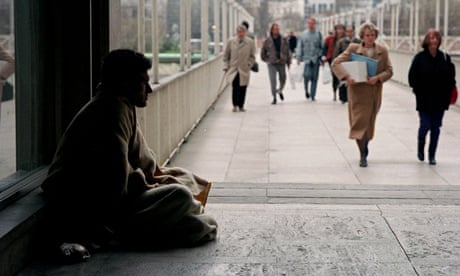
Photo credit: The Guardian
In the news
The Howard League for Penal Reform has called for a review of the “unfair and unrealistic” Criminal Courts Charge, which “ penalises the poor and encourages the innocent to plead guilty”. The mandatory charge of up to £1,200 is imposed on those who admit committing minor misdemeanours, regardless of their circumstances.
The charity has compiled a list of cases where heavy financial charges have been demanded of people convicted of low-level offences. These include the case of a 38-year-old homeless man who admitted persistently begging in Oxford, and breaching an Asbo prohibiting him from sitting within 10 metres of a cash machine. He was jailed for 30 days and ordered to pay a £150 criminal courts charge.
Frances Crook, Chief Executive of the organisation, has said of the newly introduced procedure:
“It was the French writer Anatole France, more than 100 years ago, who wrote that ‘In its majestic equality, the law forbids rich and poor alike to sleep under bridges, beg in the streets and steal loaves of bread’. Now the law seems hell-bent on exacting charges from rich and poor alike for the privilege – but it is the poor who will find themselves entrenched in their poverty by these criminal charges.”
In other news
- The Independent: Analysis of recently published data suggests that in 36 out of 39 police forces, black people are more likely than other ethnic groups to be stopped and searched. Statistics released by Dorset Police indicate that a black person in the county is 17 times more likely to be searched than a white person.
- A pilot scheme requiring landlords to check the immigration status of potential tenants has been “a failure”, reports the Guardian. The nine-month trial conducted in the West Midlands has resulted in only seven landlords being penalised. An investigation into the scheme found that it may have encouraged landlords to turn away British citizens without passports.
- Communities Secretary Greg Clark has announced measures to be included in a forthcoming Immigration Bill intended to “crackdown on rogue landlords and make Britain an even harder place for illegal migrants to operate”. Tenants without leave to remain in the UK might in some circumstances be evicted without landlords needing to obtain a court order. The proposals run “roughshod over centuries of land law”, writes Giles Peaker for Nearly Legal, and are likely to be “a complicated mess.”
- The European Court of Human Rights has published a fact sheet on terrorism case-law, which is available here. It lists key complaints against signatories of the Convention, including the United Kingdom.
- A Daily Mail comment piece has described the Human Rights Act 1998 as a “toxic piece of legislation, which allows [lawyers] to profitably ride roughshod over the wishes of Parliament and the British public”. ObiterJ is critical of the paper using the case of Bourgass [concerning the solitary confinement of prisoners] to support its position. As the writer points out, the Supreme Court reached its decision on the basis of English common law – the case did not depend on the Human Rights Act at all.
In the courts
The Court of Appeal in Serdar Mohammed v Secretary of State for Defence has ruled that the detention of an Afghan suspect by British armed forces for almost four months was unlawful. Afghan law required any person detained by British forces to be handed over to Afghan authorities after 96 hours. The public law claim of SM was successful on the basis that his detention was arbitrary and therefore contrary to Article 5 ECHR [the right to liberty]. Further, a private law claim in tort under the law of Afghanistan could in this instance be made in the English courts, since no compelling grounds of public policy had been raised to defeat it.
The Court’s response to the Secretary of State’s proposition that authority to detain in a non-international armed conflict could be derived from the treaty law of International Humanitarian Law is considered by Dr Alex Conte. The analysis concludes that the Court most certainly got it right in determining that it was “not possible to base any implication of a power to detain in an internationalised non-international armed conflict purely on a treaty” [para. 219 of the judgment]. See also 1COR’s Dominic Ruck Keene here.
The Guardian reports on the judgment here.
UK HRB posts
- On fairness and principle: the legacy of ZZ re-examined – Michael Rhimes
- The legal fog of war among the people – Dominic Ruck Keene
- When can the courts rule on the legality of future behaviour? – Rosalind English
- Supreme Court: a right to a student loan? – David Hart QC
Events
If you would like your event to be mentioned on the Blog, please email the details to Jim Duffy, at jim.duffy@1cor.com.
Filed under: Costs and Procedure, Housing, In the news, Police, Roundup Tagged: Criminal Courts Charge, Howard League for Penal Reform, Sedar Mohammed, stop and search